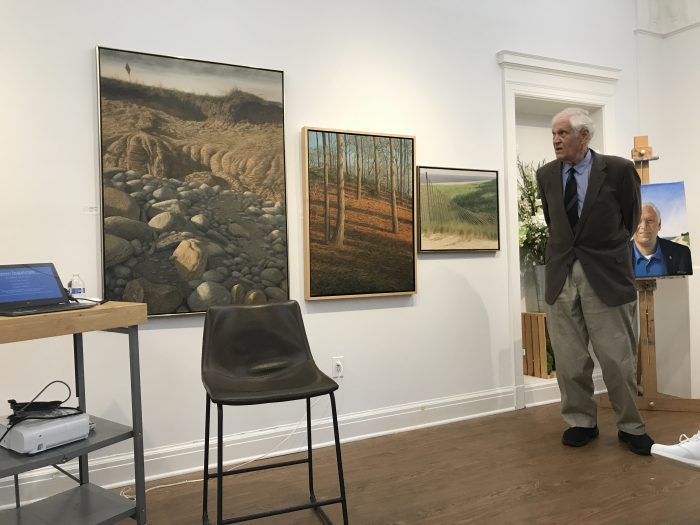History Close at Hand: The many mysteries of Reboli’s paintings

By Beverly C. Tyler
At the Reboli Center in Stony Brook on Friday evening, Aug. 18, former New York State Assemblyman Steve Englebright (D-Setauket) presented a love letter to Long Island and its people through the landscape paintings of Joe Reboli.
Englebright, a geologist also running against Anthony Figliola (R-East Setauket) for Suffolk County’s 5th Legislative District, opened for each of us who attended a new, personal and intimate view of Reboli’s paintings.
In his opening comments, Englebright touched on the importance of Reboli’s work as a local artist.
“Joe Reboli speaks directly to us through his paintings, through his art,” Englebright said. “Joe also speaks now and forever to all who would live here in our community. I believe that open space is the beginning of our story. It’s what attracted the first colonists here, and … I believe that Joe’s paintings suggest that open space should continuously be an important part of our story.”
Englebright noted that he was initially surprised and then intrigued by Reboli’s detail in painting the most ordinary features of nature, including rocks and mud, in how they form and react to the forces of wind and waves.
The first and largest painting was described thus:
“It is likely the Montauk Till — I call it an ice contact deposit — which means that the upper third of the painting is the till that was dropped directly, melted directly, out of the ice, and it included all of the different grain sizes — everything from clay to silt to sand to pebbles to cobble to boulders — that range of that spectrum of different grain sizes is all contained inside of that pumpkin-colored fill,” the former state assemblyman elaborated. “But when the waves break on it, they take away the small stuff, and we have a lag deposit of the boulders and cobbles.”
Englebright also noted the simple beauty and the importance of what Reboli included in his works. “Joe’s paintings speak to us regarding our exquisite coastal heritage,” he said. “Each of his natural images is a journey into nature’s splendor.”
Describing the middle painting, Englebright added, “This is quite amazing. It is a remarkable painting. Avalon is lovingly cared for, and Joe painted this before Avalon was there. They are either red oak or chestnut oak.”
Englebright described the third painting as “the convergence of a manmade feature and a natural feature. The pushed-down fence invites you into the natural world.”
With a series of slides of Reboli’s paintings, Englebright noted how Reboli placed fences, gates, chairs and even old rusting gas pumps into his images of the natural world. Sometimes, they were items that we could imagine belonged in an area of human habitation. In others, such as the images of rusting gas pumps juxtaposed in the foreground of a beach scene, Englebright suggested Reboli illustrated the permanence of the natural world over manufactured objects.
Noting that “respect for this place is infused into Joe’s paintings,” a few of Englebright’s thoughts show Reboli’s love of Long Island. “With the body of his work, Joe Reboli’s Long Island is imaginative, inviting, and I ask the question: Is he not Long Island’s most imaginative storyteller through his paintings?”
Englebright concluded, “Many of Joe Reboli’s paintings have become iconic images representing our sense of place. Joe’s paintings have defined what it means to be a Long Islander. Joe Reboli’s paintings enable us to focus upon the beauty of our community’s natural wonders. Joe’s body of work is breathtaking in its expanse and its beauty,” adding, “Joe painted sites and landscapes that should be saved for all time.”
Beverly C. Tyler is a Three Village Historical Society historian and author of books available from the society at 93 North Country Road, Setauket. For more information, call 631-751-3730.






